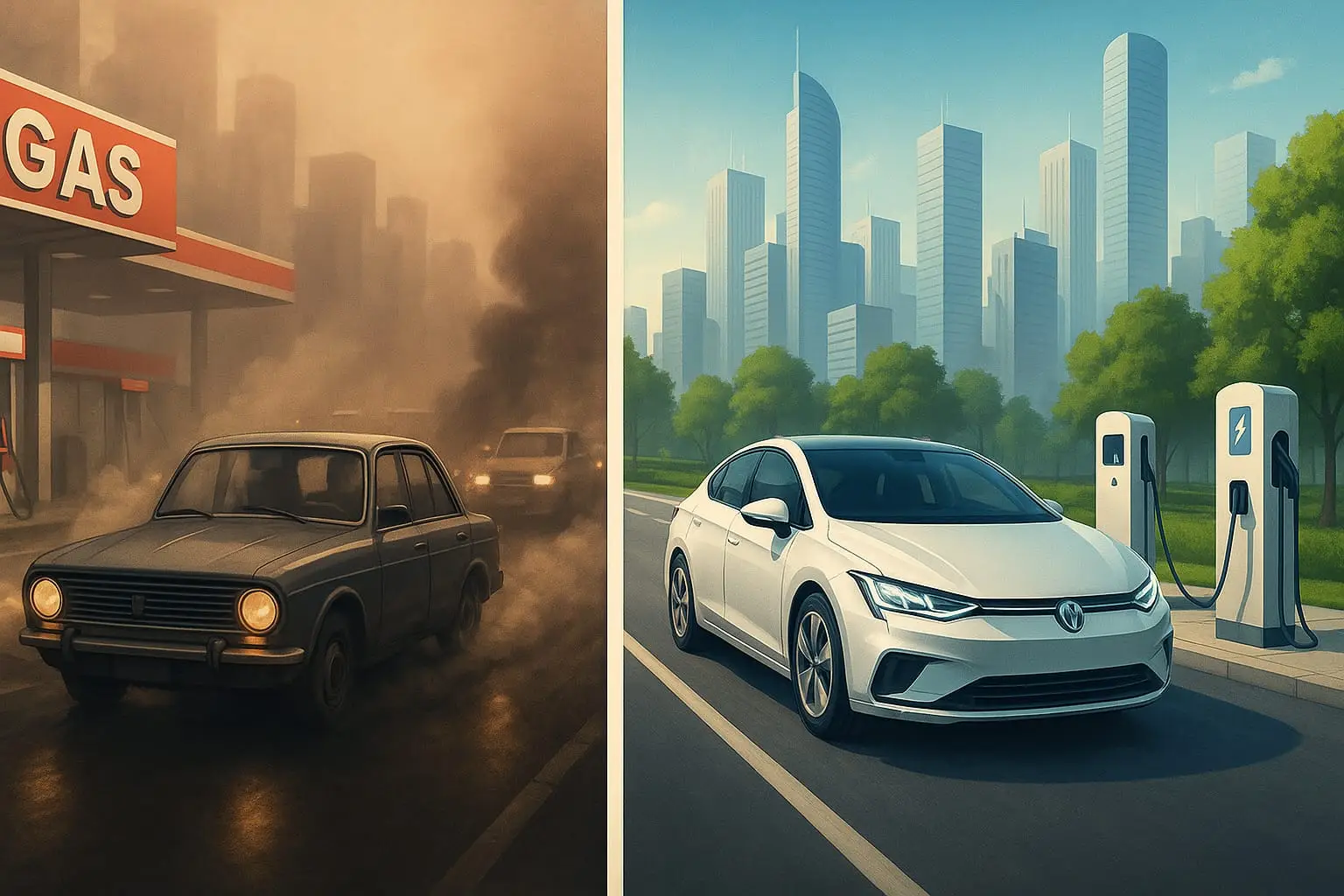Petrol Cars vs EVs: 5 Key Differences to Help You Choose
By Aditya · April 2025

Petrol vs Electric Cars – A riveting debate
For over a century, petrol cars have dominated the roads, offering powerful engines and quick refueling. However, electric cars (EVs) are rapidly changing the game with lower emissions and innovative technology. If you’re debating between petrol vs electric cars, this guide covers 5 key differences to help you decide.
5 Key Comparisons: Petrol vs Electric Cars in 2025
1. Design & Performance
Petrol Cars
- Use internal combustion engines (ICE) with complex parts (gearbox, exhaust, cooling systems).
- Require regular maintenance (oil changes, spark plugs, belts).
- Deliver power gradually due to gear shifts.
Electric Vehicles (EVs)
- Powered by battery packs and electric motors (fewer moving parts).
- Offer instant torque for faster acceleration.
- No need for oil changes, exhaust systems, or radiators.
Verdict: EV’s win for low maintenance and smoother performance, while petrol cars appeal to traditional driving enthusiasts.
Related: How EV Motors Work
<!– Ad Placeholder –>
<div class=”ad-space” style=”display: none;”>[Ad will go here]</div>
2. Convenience: Refueling vs Charging
Petrol Cars
- 5-minute refueling at widespread gas stations.
- Better for long road trips (no range anxiety).
Electric Vehicles
- Home charging (wake up to a full “tank”).
- Fast-charging stations (30-45 mins for 80% charge).
- Limited rural charging infrastructure in some areas.
Verdict: Petrol cars are better for long-distance travel, while EVs excel for daily commutes.
<!– Ad Placeholder –>
<div class=”ad-space” style=”display: none;”>[Ad will go here]</div>
3. Cost Comparison
Petrol Cars: The Immediate Savings
Petrol vehicles typically have a lower upfront price tag, making them more accessible for budget-conscious buyers. However, owners face ongoing expenses that add up significantly over time. Fuel costs range between ₹90-₹105 per liter, with frequent fill-ups required for regular drivers. Maintenance demands are also higher – routine oil changes, spark plug replacements, timing belt services, and exhaust system repairs contribute to substantial annual upkeep costs. The internal combustion engine’s complexity means more components that can wear out or fail, leading to potentially expensive garage visits beyond standard servicing.
Electric Vehicles: The Long Term Value
While EVs command a higher initial purchase price due to their advanced battery systems, government incentives and tax breaks can substantially reduce this premium. The real savings emerge in daily operation – electricity costs average just ₹2-₹5 per kilometer, a fraction of petrol expenses. With far fewer moving parts (no engine oil, transmission fluid, or complex exhaust systems), maintenance is dramatically simpler and cheaper. Regenerative braking reduces wear on brake pads, and there are no spark plugs or timing belts to replace.
Over 5-7 years of ownership, most EV drivers save 70-80% compared to petrol car owners, with additional benefits like lower registration fees and toll discounts in many regions making the financial case even stronger. So the higher initial cost of electric cars in India often balances out over time with lower maintenance and fuel expenses.
4. Environmental Impact
Petrol Cars
- Emit CO₂, NOx, and particulate matter.
- Contribute to air pollution and climate change.
Electric Vehicles
- Zero tailpipe emissions.
- Battery production has a carbon footprint (but improving with recycling).
Verdict: EVs are cleaner overall, especially in cities.
Related: Click here for EPA Emissions Report
5. Long-Term ROI: Which is Worth It?
Petrol Cars:
- Better short-term ROI (cheaper upfront).
EVs:
- Higher long-term savings (fuel, maintenance, tax breaks).
Example: After 5-7 years, an EV often becomes cheaper than a petrol car.
Final Verdict: Should You Buy a Petrol or EV Car?
Choose an EV if:
- You drive mostly in the city.
- Want lower running costs.
- Care about environmental impact.
Stick with petrol if:
- You frequently travel long distances.
- Need quick refuelling in remote areas.

